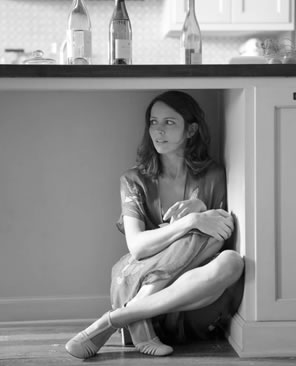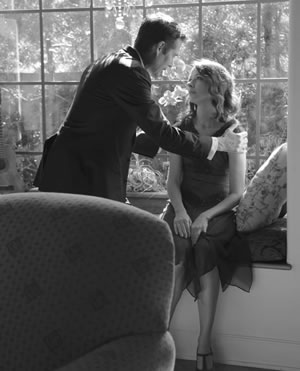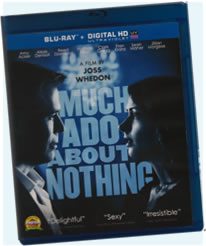Much Ado About Nothing
Innate Understanding of Shakespeare's Ways
Underlies Whedon's Masterful Much Ado
Bellweather Pictures (2013)
Directed by Joss Whedon. With Amy Acker (Beatrice), Alexis Denisof (Benedick), Nathan Fillion (Dogberry), Clark Gregg (Leonato), Reed Diamond (Don Pedro), Fran Kranz (Claudio), Jillian Morgese (Hero), Tom Lenk (Verges).

In the second gulling scene, Beatrice (Amy Acker) hides under a counter in Joss Whedon's kitchen to eavesdrop on Hero and Ursula describing Benedick's love for her. Below, Benedick (Alexis Denisof) comforts Beatrice after Hero's aborted wedding. Whedon filmed Much Ado About Nothing in 12 days at his own home. Photos courtesy of muchadomovie.com, Bellweather Pictures.
They finally hug. He's professed his love for her; she, in return, professes her love for him. Their spontaneous embrace mingles her tears with his exhalation of relief. "Come," he says in her ear, "bid me do anything for thee." The camera closes in on her face lying upon his shoulder. "Kill Claudio," she says.
This line, spoken by Beatrice to Benedick calling on him to kill his boon companion even at the romantic climax of Much Ado About Nothing, is one of William Shakespeare's most problematic moments in the entire canon. Do you play it for laughs, or is it meant to be serious? Yet, many of us have experienced similar theatrical moments before, when our hearts flipped from two emotional jolts rendered simultaneously. We felt it when Buffy the Vampire Slayer told Angel "I love you" just as she thrusts a sword through his chest to send him to the farthest reaches of hell. We felt it when Gunn dusted his sister at the very moment she promises him eternal life as a vampire on Angel. We felt it when Wash safely lands Serenity during an intense attack from the Reavers and repeats his mantra, "I am a leaf on the wind—watch how I soar," in amazed relief, and in that instant is skewered by a giant spear shooting into the spaceship's cockpit.
Joss Whedon is responsible for all of these moments, including the one described above between Beatrice and Benedick in his just-released film version of Much Ado About Nothing. Whedon is a Shakespeare fan, has been much of his life, so Shakespeare informs his work as much as does his longtime appreciation of comic books and horror films. Whedon's characters don't speak iambic pentameter verse, but almost every one is a singular creation—some now iconic—richly rendered through the words they speak, just as Shakespeare's characters. Whedon expertly weaves allegorical arcs through his works, just as Shakespeare did. Whedon also understands and exploits, as Shakespeare did, how comedy and tragedy can be two sides of the same coin. Neither Shakespeare nor Whedon has any qualms juxtaposing contrary emotions in the same scene. Adding to the examples above, but going in the other direction from dramatic to funny, is The Avengers villain, Loki, threatening destruction on the Hulk only to be interrupted by the angry green giant suddenly snatching him and treating him like laundry being beaten on the rocks.
That's why I've been amused that so many early reviews of Whedon's Much Ado express pleasant surprise at the final product. Shakespeareans are skeptical: Given that this is a product from the man who created Buffy the Vampire Slayer (with the spinoff, Angel, about a private eye vampire with a soul), who created Firefly (spaceship-riding cowboys in the future), who created Dr. Horrible's Sing-Along Blog, and who helmed the comic character smashup blockbuster The Avengers, Shakespeareans worry over what he would do to a Shakespeare play. Mainstream critics, meanwhile, seem dubious that even Whedon could make Shakespeare interesting. But the many Shakespeare geeks who love Whedon's work and know of his affinity for Shakespeare—including how he hosted weekly readings of Shakespeare's plays at his home with cast members of his television shows—approach the film as I did, with high expectations and even higher hopes.
Whedon exceeds both. And in Whedon's hands, so does Shakespeare. Filmed in 12 days at Whedon's own home—ostensibly a vacation after he wrapped shooting on The Avengers but before he started editing the film—this Much Ado About Nothing intuitively captures the play's wit and edge and presents the characters as the multi-dimensional people Shakespeare portrayed. It should be noted, too, that though the film is set in modern-day Southern California and much of the text is trimmed, little of what's left is altered: the actors generally speak Shakespeare's lines as written, and Whedon in no way alters the play's Claudio-Hero plot. Instead, he alights on a visual clue to explain some of the play's more bizarre behavior: these people hanging around Leonato's estate drink a lot. More wine is consumed in this movie than in a season's worth of Cougar Town, and shots of tequila follow. This device even handles Don Pedro's awkward marriage proposal to Beatrice and her jesting reply; he and she are two sheets to the wind, so it must be the booze talking.
The film's centerpiece, which more than anything else elevates the movie to a top-tier Shakespearean product, is Amy Acker's portrayal of Beatrice. As with most of the cast, Acker is a Whedonverse veteran, and notably Whedon has cast her in roles that combine superior intelligence with sex appeal. She is the braniac Fred in Angel who eventually is possessed by the action-figure goddess Illyria, and she is Dr. Saunders in Dollhouse who spends an episode as the super-freak wild thing, Whiskey. Her Beatrice is quick-witted and intellectually confident, but she also engages in pratfall-style physical humor as smooth as that of any comedienne headlining movies this summer. And she is absolutely lovely in her classically trimmed, airy dresses. As Benedick and Claudio discuss the merits of Hero while watching her from the stairway landing, Beatrice walks in to their view, inspiring Benedick to say, "There's her cousin, an she were not possessed with a fury, exceeds her as much in beauty as the first of May doth the last of December." Meaning no denigration to Jillian Morgese playing Hero, but in this case Benedick is absolutely right. Alexis Denisof says the line matter-of-factly, too, but that's this Benedick's way.
At one of Whedon's weekly play readings many years ago, Acker and Denisof—who played Wesley to Acker's Fred in Angel—read the parts of Beatrice and Benedick, and Whedon noted an immediate chemistry that started him down the creative path to making this film. That chemistry is yet palpable, charging the action even before Shakespeare's play begins as Whedon opens with a backstory for Benedick and Beatrice (and makes a later allusion in flashback). Forgoing the smarmy charm of the many fine Benedicks I've seen, including Kenneth Branagh's film interpretation, Denisof portrays a self-assured soldier (something akin to a secret service agent in Whedon's version), even keel in all things, whether it's serving his duke or dealing with women. He comes off as a bit distant in dialogue, but get him alone in soliloquy and we see a man letting his self-confident guard down a little—just a little, he believes—as he shores up his inner confidence. His is a man's man's reading of the part until his character begins to lose his bearings when he decides to requite Beatrice's love. Yet, when she engages him to kill Claudio, this Benedick reveals himself capable of being a coolly confident professional killer.
A more comic portrayal of law and order comes in the form of Dogberry (Nathan Fillion) and Verges (Tom Lenk), who seem to have watched buddy cop movies and TV procedurals as their training in law enforcement. At the cop shop they give directions to the night's watch with know-all arrogance, they interrogate Borachio and Conrade in a good-cop/bad-cop format, and they deliver the "arrant knaves" to Leonato with a great display of gravitas. Fillion, who has built a career by perfecting a facial expression that blends utter confusion with cocky confidence, gives a pitch-perfect performance of Dogberry and the earnestness that drives his silly behavior. When Conrade (Riki Lindhome) in understandable frustration erupts into calling him an ass, Fillion's Dogberry reacts with appropriate indignation. But then he motions to have Conrade and Borachio (Spencer Treat Clark) ushered out, and he continues his famous speech—"Masters, remember that I am an ass"—to Verges alone. In doing so, he seems to suspect that Conrade's claim has some veracity, and he sets about convincing himself that he is not an ass but "a wise fellow, and which is more, an officer, and which is more, a householder, and which is more, as pretty a piece of flesh as any in Messina." Fillion delivers this last argument with nothing but Dogberry's truth. Kudos to Lenk, too, whose overeager Verges occasionally forgetting his place in Dogberry's pecking order is richly comic.
 Whedon filled this cast with actors he's employed in the past, and for Whedon fans, part of the fun of watching this Much Ado is spotting who from what. It's like seeing several plays at a single repertory theater: Lenk (the third nerd in Buffy) as Verges, Clark Gregg (Agent Coulson in The Avengers) as Leonato, Reed Diamond (Dominic, chief of security, in Dollhouse) as Don Pedro, Sean Maher (Simon in Firefly) as Don John, and Fran Kranz (the geek Topher in Dollhouse) as Claudio. Morgese has only one other movie credit before taking on the part of Hero: an uncredited appearance as the woman in the restaurant in The Avengers. Whedon has a record of just-right casting, whether it's veterans or newcomers, and he scores again with Morgese's shy but inner-steeled Hero. The whole cast give solid performances serviceable to Shakespeare's play, with Maher's Don John harboring a real malevolent nature inside his lifeless eyes (even when he's sexually engaging with Conrade).
Whedon filled this cast with actors he's employed in the past, and for Whedon fans, part of the fun of watching this Much Ado is spotting who from what. It's like seeing several plays at a single repertory theater: Lenk (the third nerd in Buffy) as Verges, Clark Gregg (Agent Coulson in The Avengers) as Leonato, Reed Diamond (Dominic, chief of security, in Dollhouse) as Don Pedro, Sean Maher (Simon in Firefly) as Don John, and Fran Kranz (the geek Topher in Dollhouse) as Claudio. Morgese has only one other movie credit before taking on the part of Hero: an uncredited appearance as the woman in the restaurant in The Avengers. Whedon has a record of just-right casting, whether it's veterans or newcomers, and he scores again with Morgese's shy but inner-steeled Hero. The whole cast give solid performances serviceable to Shakespeare's play, with Maher's Don John harboring a real malevolent nature inside his lifeless eyes (even when he's sexually engaging with Conrade).
The movie's only misstep is in transposing Act Five, Scene Two—Benedick and Beatrice, after he assures her he has challenged Claudio, exchanging love quibbles—with Scene Three featuring Claudio's obsequies at Hero's tomb (here a candelit progression). Switching these scenes puts Beatrice and Benedick learning of Hero's and Claudio's acquittal after Beatrice has joined Hero in watching Claudio lead the wake to the tomb. This continuity error is inserted without any redeeming thematic or mood purpose. Really, Shakespeare provides enough continuity issues in his plays, why add one? Maybe Whedon is channeling even The Bard's faults.
That he does channel Shakespeare's particular creative gifts is part of the treasure of this movie. Much Ado About Nothing, from its title to its characters, is a play about people thinking things are what they are not. Benedick thinks he's too smart to love and then readily, easily, falls in love when he falsely believes a woman loves him. Beatrice likewise claims she is too smart to marry, but her behavior indicates otherwise. Claudio is abused into mistaking Hero's virtue, and unwittingly casts doubts on his own virtue among others. Dogberry believes himself to be "one that knows the law," but in fact he is an ass. While Shakespeare had no set to extend the metaphor visually, Whedon has his own home as a setting. As they are directed to the bedroom they will use for their stay at Leonato's house, Claudio, newly infatuated with Hero, asks Benedick his opinion of her. "Do you question me as an honest man should do, for my simple true judgment?" Benedick replies, lugging his professional gear, including firearms. "Or would you have me speak after my custom, as being a professed tyrant to their sex?" This line finishes as he enters their assigned bedroom, obviously that of two little girls as it's decorated in plush toys and frilliness, a perfect place for this "tyrant to their sex" to sojourn. In the final wedding scene, Claudio says he will hold his promise to marry the mysterious cousin of Hero "were she an Ethiope," and in clear view among the wedding guests behind Claudio is an African-American woman, a hint here that Claudio still is socially clueless.
Such subtleties, visually and in minute touches in character portrayals and line readings, are what Whedon brings to Shakespeare. He's returning a favor, for Shakespeare has already brought so much to Whedon's work. When I first launched Shakespeareances.com in October 2011, before the announcement that Whedon had made his film, I listed my Top 40 Shakespeareances and my Top 10 Non-Shakespearean Theatrical Moments. Number nine on the latter list is "Joss Whedon," where I wrote, "My greatest Shakespearean wish is for him to film some of the plays, if not the entire canon."
One down. I'm wishing still.
Eric Minton
June 21, 2013
 Now On DVD (Lionsgate)
Now On DVD (Lionsgate)
The overriding takeaway from a commentary track featuring the director and the entire cast (sans Nathan Fillion, who had a prior commitment), as well as the featurette "Bus Ado about Nothing," about a cast bus trip to the South by Southwest Festival in Austin, Texas, is that they all sure have a lot of fun together. Lots of laughing, lots of clowning, and lots of drinking.
The all-cast commentary track is like being at a frat kegger with everybody talking at the same time and drinking. They even turn the excessive drinking in the movie into a drinking game (you can hear the clinking glasses) and, notably, the amount of talking begins to thin out toward the end of the movie. But by the time you can finally hear individuals talking, what they say lacks clarity. Other than hearing their love for each other, you fully sense their utmost respect for Fillion's performance as Dogberry and Amy Acker's portrayal of Beatrice; when she gets to her "That I were a man" speech, the cast members shush each other and let the film's dialogue come to the fore.
Whedon does a solo commentary track, too. Given this film's backstory—how he shot it at his own home as a 12-day vacation after shooting wrapped on The Avengers, how he gathered a cast of Whedonverse alumni, how he maintained absolute secrecy around the project until after he had completed filming—and Whedon's celebrated reputation as an auteur, this commentary is the most enticing. However, Whedon generally sounds bored and somewhat embarrassed to talk about his work.
"Location scouting in this case was walking around every room with a cup of tea imagining Shakespeare," he says. OK, so why did he put Benedick and Claudio in his daughters' room? Why exactly did he use the pool for Don John's ensnaring of Claudio, a scene that he so carefully visualized? This is also a man who has loved Shakespeare almost all his life, but we get little in the way of learning how he translated text into action and visual. What he offers is tantalizing, such as his take on Don Pedro's idea of being Claudio's proxy in courting Hero as simply an eternal skirt-prowling bachelor's stupid idea. However, he brings it up mainly to explain the performances of Reed Diamond (Pedro) and Fran Kranz (Claudio) in that scene.
Most of the insights are on lighting techniques and his use of cool elements of the house designed by his wife, Kai Cole. The amphitheater where the wedding takes place she added to the landscape specifically for staging his weekly Shakespeare readings. Other behind-the-scene bits include the cops trying to shut down production when neighbors complained about too many extras parking on their streets, the cinematographer injuring himself getting just the right shot, and real fog rolling in at the perfect time for specific scenes that needed foggy atmosphere. Longtime Whedon fans will appreciate his observation that in the performances of Acker as Beatrice and Alexis Denisof as Benedick, he "resurrected Fred and Wesley and gave them a happy ending."
He also touches on an aesthete that other film directors of Shakespeare might want to consider: given his short timeframe shooting the movie, Whedon approached it as a live performance. "What we got is what we have," he says. Indeed, the film's most magical moments are spur-of-the-moment inputs from the cast: Don John stealing the cupcake after the disrupted wedding, Dogberry trying to put on the much-shorter Verge's sport coat, Benedick's eavesdropping antics during the gulling scene, Beatrice sinking to the sofa during her "that I were a man tirade" (and the cameraman staying right with her), and the in-character, off-camera antics of Fillion and Lenk that would end up being one of the movie's most famous scenes when Whedon turned the camera around and caught Dogberry and Verges locked out of their car. That spirit of living Shakespeare's text—even among the cast members not expert at delivering it—is what makes Whedon's Much Ado about Nothing so accessible.
Eric Minton
December 14, 2013
Comment
Loved reading your review of the Joss Whedon Much Ado About Nothing. I agree with you 100 percent. I'm so glad you see that the drinking explains EVERYTHING :). I also liked, as Whedon explained in an interview, that he's been employing Shakespeare's techniques throughout his career. In another life, I'll be one of the buddies invited for Sunday afternoon Shakespeare readings.
I, too, loved Amy Acker, and thought her "Benedick, love on" speech is the best I've heard. It vies with Benedick saying "Here you may see Benedick the married man" in front of the Barbie Dream House for Lori's favorite moment of the movie. But there are so many show stealers.
Thank you!
Lori Davis
Comment: e-mail editorial@shakespeareances.com
Start a discussion in the Bardroom



 Find additional Shakespeareances
Find additional Shakespeareances